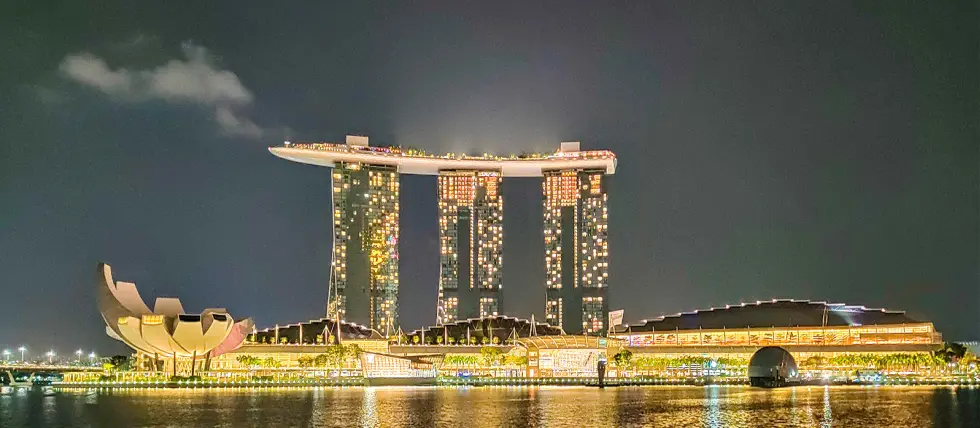Updated Gambling Laws Take Effect in Singapore
On October 30, Singapore's revised Casino Control (Amendment) Act 2024 (CCA) officially brought into effect several new regulatory provisions aimed at enhancing control and oversight within the city-state's casino sector. The updated legislation, approved by Singapore's parliament on September 10, has been implemented to streamline the regulatory framework for casinos, strengthen protections for vulnerable individuals, and address the casino entry levy structure.

The Marina Bay Sands in Singapore at night. (Source: Singapore Tickets)
The amendments signal a significant step in the government's approach to casino regulation. Singapore is looking to balance the economic benefits of its gaming industry with a strict regulatory regime that prioritizes social responsibility and effective oversight, and the new laws are designed to help it reach that goal.
According to a press release issued by the Ministry of Home Affairs on October 29, the amended act introduces several key regulatory changes. The ministry highlighted the law's aim to improve the operational effectiveness of Singapore's casino regulatory framework, tighten regulations for licensees and casino operators, enhance protections for at-risk populations, and formalize entry levies collected between April 4 and May 7, 2024.
The entry levy revision resolves an administrative issue related to the fees paid by Singapore citizens and permanent residents when entering the country's two casinos. Between these dates, the levy rates had reverted to previous levels due to a delay in enacting the current regulations, which the amended act now corrects by setting the entry levy at SGD150 (US$113) per day or SGD3,000 (US$2,260) annually.
The CCA represents a major revision in Singapore's approach to casino entry policies, reinforcing the government's objective to regulate local access to gambling facilities while managing potential social impacts. By re-establishing the parliament's intended levy structure, the amendment ensures that entry fees contribute toward discouraging excessive or impulsive gambling, particularly among Singapore citizens and permanent residents. The entry levy is not applicable to foreign visitors.
The Ministry of Home Affairs also stated that other provisions included in the revised act will be introduced at a later date, leaving room for further developments in the regulatory landscape for casinos in Singapore.
More Business News
Reducing Financial Crime at the Heart of the Reforms
While the recent press release did not mention other provisions discussed during the bill's reading in parliament, the initial August proposal had included plans to allow cashless gaming in the country's casinos. This potential shift to digital or cashless transactions could align with broader trends in global casino operations, where cashless payments have increasingly become an option to streamline the customer experience and enhance security.
No details on this operational change were specified in the recent ministry announcement. As such, it remains unclear when or if cashless gaming will be introduced in Singapore's casinos under this new regulatory framework.
One of the more notable provisions within the amendment includes a mechanism allowing Singapore's two casino operators, Resorts World Sentosa (RWS) and Marina Bay Sands (MBS), to share patron data without requiring customer consent. The data-sharing provision is specifically designed to address financial crimes such as money laundering, terrorism financing, and the financing of weapons proliferation. By enabling a seamless exchange of information between operators, the law seeks to improve the effectiveness of the industry's anti-money laundering measures and meet international standards for transparency and accountability.
Singapore's casino industry remains a duopoly between RWS, managed by Genting Singapore Ltd., and MBS, operated by a subsidiary of Las Vegas Sands. Both properties are significant contributors to Singapore's tourism and economy, each offering a range of luxury amenities and entertainment options.
Despite the tightened regulations, Sands recently announced plans to increase its investment in MBS from $4 billion to $8 billion, suggesting confidence in the long-term profitability of Singapore's gaming market. This investment is expected to enhance the property's offerings, with the expanded budget potentially allowing for new facilities, high-end retail options, and upgrades to attract additional visitors.
RELATED TOPICS: Business
Most Read
Must Read
 Interviews
Interviews









Review this New Post
Leave a Comment
User Comments
Comments for Updated Gambling Laws Take Effect in Singapore